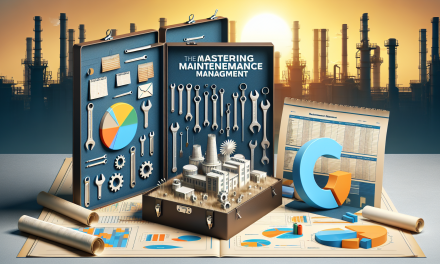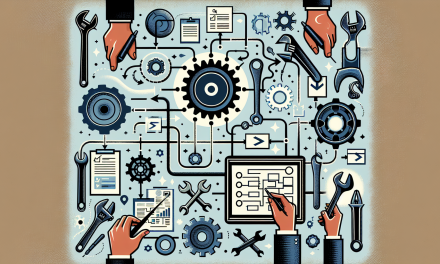Table of Content
- Introduction
- Why Maintenance Management Matters
- Key Components of Effective Maintenance Management
- The Role of Technology in Maintenance Management
- Challenges in Maintenance Management
- Essential Skills and Knowledge Needed
- Benefits of This Certification
- Real-World Application of Maintenance Management
- FAQs
- Conclusion
Introduction
In today’s fast-paced world, managing maintenance effectively plays a critical role in ensuring operational success. Every organization seeks to enhance productivity while minimizing downtime and maintenance costs. The Mini Master in Maintenance Management & Technology Certification equips professionals with essential tools and skills to excel in this vital area.
Why Maintenance Management Matters
Firstly, maintenance management encompasses much more than simply performing preventive tasks. Its significance grows, particularly in sectors where machinery and equipment form the backbone of operations. Without proper maintenance, equipment can fail, leading to costly downtime. Therefore, a clear and strategic approach to maintenance ensures that assets remain operational, providing value to the organization.
Moreover, effective maintenance management contributes to overall safety and compliance within the workplace. When organizations prioritize maintenance, they create a safer environment for employees. By providing ongoing training and adhering to best practices, companies reduce risks associated with machinery malfunctions and other potential hazards.
Key Components of Effective Maintenance Management
Several key components constitute effective maintenance management. First and foremost is the development of maintenance strategies. These strategies should accommodate various needs, such as predictive maintenance, preventive maintenance, and corrective maintenance. Each method has its unique advantages and should align with the organization’s overall objectives.
1. Predictive Maintenance
Predictive maintenance utilizes data and analytics to determine when equipment will need maintenance. By predicting problems before they occur, organizations can significantly reduce unscheduled downtime and repair costs.
2. Preventive Maintenance
Conversely, preventive maintenance entails routine inspections and services designed to prevent breakdowns before they happen. Implementing a scheduled maintenance program contributes to the longevity of equipment and increases operational efficiency.
3. Corrective Maintenance
Corrective maintenance is necessary when equipment has already failed. Although it may seem reactive, it’s crucial for managing and minimizing disruptions while tackling unforeseen challenges.
The Role of Technology in Maintenance Management
Technology has dramatically impacted maintenance management. Utilizing modern tools and systems not only streamlines processes but also enhances decision-making. For example, asset management software allows teams to track the performance and conditions of various assets, providing valuable insights into their operational requirements.
Moreover, artificial intelligence (AI) and the Internet of Things (IoT) have transformed maintenance management by enabling real-time monitoring. With sensors installed on equipment, organizations can receive immediate alerts regarding any irregularities, facilitating prompt action. This proactive approach reduces downtime and prevents substantial losses.
Big Data in Maintenance
Understanding and leveraging big data can unlock opportunities for strategic decision-making in maintenance management. By examining historical data and recognizing patterns, organizations can enhance their operations. You can read more about this topic in the article Unlocking the Power of Big Data for Strategic Maintenance.
Challenges in Maintenance Management
Despite the advancements and importance of maintenance management, organizations face numerous challenges. One significant issue stems from skill gaps within the workforce. As technology evolves, adapting to new tools and systems requires continuous learning. Investing in employee training plays a vital role in addressing this gap.
Additionally, budget constraints can limit the extent of maintenance programs. Organizations must strike a balance between implementing innovative solutions and managing financial resources effectively. Prioritizing critical assets and adapting strategies accordingly can prove beneficial in these situations.
Essential Skills and Knowledge Needed
To excel in maintenance management, professionals need diverse skills and knowledge. Understanding the principles of maintenance management, coupled with technical expertise, forms the foundation for success. Moreover, strong analytical skills enable professionals to assess data and make informed decisions.
Communication Skills
Effective communication is vital, as maintenance management often involves collaboration among various departments. A clear dialogue ensures team members understand their responsibilities while promoting a culture of continuous improvement.
Project Management
Additionally, project management skills are essential for overseeing maintenance projects. Professionals must manage schedules, resources, and budgets while ensuring they meet quality standards.
Benefits of This Certification
Engaging in the Mini Master in Maintenance Management & Technology Certification offers numerous benefits for professionals. First, it enhances your knowledge and equips you with the latest industry practices. Gaining a comprehensive understanding of maintenance management principles enables you to drive improvements within your organization.
Furthermore, this certification strengthens your resume. In a competitive job market, having specialized certifications demonstrates your commitment to professional development, setting you apart from other candidates.
Networking Opportunities
Moreover, participating in this program allows for building valuable connections with peers and industry professionals. Networking opens doors for future collaborations and can lead to career advancement opportunities.
Real-World Application of Maintenance Management
Real-world application is vital for translating theoretical knowledge into practical skills. Professionals can observe the concepts learned during their studies in action within their organizations. This practical experience reinforces understanding and enables teams to adapt strategies to their unique operations.
For instance, energy-efficient buildings rely on effective maintenance practices to optimize systems. The article Mastering Building Services Management: A Comprehensive Guide provides insights into maintaining facilities efficiently.
FAQs
1. What is maintenance management?
Maintenance management involves ensuring that assets and equipment function effectively through planned maintenance and timely repairs. It aims to minimize downtime and operational costs while maximizing equipment lifespan.
2. How does technology impact maintenance management?
Technology enhances maintenance management by providing tools for tracking, monitoring, and analyzing asset performance. This allows organizations to implement data-driven maintenance strategies and improve overall efficiency.
3. What skills do I need for a career in maintenance management?
Successful maintenance management professionals possess strong analytical, project management, and communication skills. Additionally, technical expertise in equipment and maintenance practices is essential.
Conclusion
In conclusion, mastering maintenance management represents a pivotal step toward enhancing operational efficiency and success. Pursuing the Mini Master in Maintenance Management & Technology Certification prepares professionals for the challenges and opportunities within this vital field. By embracing the latest technologies and cultivating essential skills, individuals can make meaningful contributions to their organizations while advancing their careers.
As you embark on this journey, explore additional resources such as Understanding Machinery Failure: Vibration Issues and Predictive Maintenance Strategies and Unlocking the Secrets of Effective Road and Infrastructure Maintenance Training to deepen your understanding and apply best practices in maintenance management.





